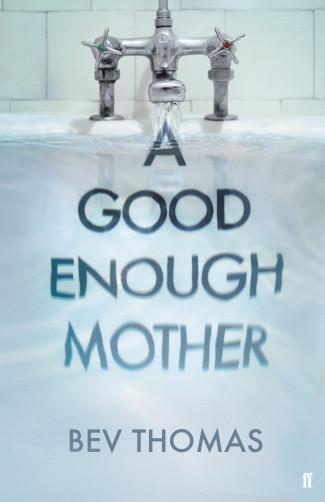
Once again my Summer Reads selection was greeted with huge enthusiasm and I’d like to say a big thank you for all the interest, appreciation of the blog and help getting the word out about these wonderful books. This last bit matters because I don’t often choose titles which are getting a big marketing push – five of this summer’s dozen picks are from small independent publishers who do a great job of getting interesting and different writing into the hands of readers without big budgets.
Today it’s my pleasure to kick off the Summer Reads guest author season in the company of former clinical psychologist Bev Thomas, whose debut novel A Good Enough Mother ticked many boxes for me – find out more in my review at the end but first Bev takes up my invitation to discuss the perspective on motherhood which inspired her novel and its title:
It was Donald Winnicott, the British psychoanalyst who first coined the phrase a ‘good enough mother’ in 1953. It was an innovative concept, but one that’s been misinterpreted in recent years, often being used to excuse inadequate or mediocre parenting. Its intended meaning was to describe a mother who manages a difficult task; both caring for and loving her child, while stepping back and allowing them to experience enough natural frustrations to lay the foundations for a proficient coping mechanism in later life. Inherent in this concept of ‘maternal imperfection,’ is the notion of separation and resisting the desire to fix and solve, but instead, to allow a child to manage their own difficulties, thereby learning from the process. Crucially, it’s equally applicable to the response to a child’s negative or painful feelings.
It’s a difficult concept for many of us. What mother doesn’t struggle in the face of her child’s feelings of unhappiness, isolation or misery? It’s not easy to stand on the side lines of this distress, provoking as it does, a strong pull to take the feelings away. However, this can mean feelings are dismissed, minimised, or denied entirely – leaving a child feeling unvalidated, and with a message that somehow, their feelings are not okay or acceptable. The best response is to listen and simply ‘bear’ them, which gives a simple, yet fundamental message that such feelings are normal. It teaches children to navigate their own way and learn that sadness and disappointment are as much a part of life as happiness and joy.
In therapy, this mirrors a technique called containment, which is the powerful tool a therapist uses to listen and ‘hold’ difficult feelings in the room with a client, resisting the pull to simply soothe or solve the problems. There are strong parallels between the maternal concept of containment and those within the therapy room, and as a former clinical psychologist, writing my novel felt a unique opportunity to bring the two together in one book.
In A Good Enough Mother, my therapist protagonist Ruth Hartland is floored when she’s referred a new client who looks shockingly like her missing seventeen-year-old son. While an expert on others’ emotions, her own grief is her Achilles heel, blinding her to the dangerous consequences of blurring professional and personal boundaries.
The narrative switches between her therapy work in the present, and her journey as a mother to twins Tom and Carolyn. We learn how her daughter has seemingly sailed through life, while her son Tom has always struggled to fit in socially. While the twins are different, Ruth also relates to them in very different ways and it’s left to the reader to decide on the extent to which her inability to step back as a mother contributes to her son’s difficulties.
Ruth is a mother, who, in spite of her experience and skills as a psychotherapist, is simply unable to bear her son’s social struggles. She becomes enmeshed and over identified with his feelings, and in her inability to separate from him, fails to appreciate the true essence of him. Instead of encouraging his uniqueness, she tries to pretend he’s someone he’s not, signing him up for activities he doesn’t want to do. Her denial is disastrous for them both – and has devastating consequences.
In a society that seems to encourage and celebrate conformity, A Good Enough Mother raises questions about how a mother manages difference in a child, and how best to respond if her child is struggling. Often the compulsion to rush in, says more about the need of the mother than the child. However misguided, Ruth’s actions don’t come from an inherently bad place, but are borne out of her own emotional struggles. As the child of an alcoholic, she grew up having her own needs and feelings stifled by the narcissistic demands of her mother. In spite of her best intentions, there are links between her own experience of being mothered, and her ability to go on to mother her own children. It is making this link, between an experience in the past and a difficulty in the present that is at the heart of her working life.
A Good Enough Mother raises questions about both motherhood, as well as psychological and mental health. There are obvious links between the two – but no easy answers to either. Winnicott’s concept of being ‘good enough’ is as relevant today, as it was all those years ago – and it’s a concept that can be usefully and mindfully applied to both mothers and therapists, as well as being an aspirational way to live life.
Thanks to Bev for this excellent piece from her expert point of view – it gave me a lot to think about as well as giving a great taste of her novel, and I’m sure parts of it will echo with many readers.

Some readers see this debut as a psychological thriller but I would call it more of a dark family drama which is intensely compelling (no other book has made me come close to missing my Tube stop three times in one evening) and has genuine psychological depth. It was the combination of psychology and motherhood which made this leap out from my book post pile. Novels featuring therapy fascinate me (I even wrote one) but most I’ve read are from the client’s perspective. A Good Enough Mother offers an authoritative view of an occupation in which the breaching of professional and emotional boundaries carries potentially disastrous consequences, as in the case of Ruth Hartland whose grave error of judgment at the outset sets the stage for a series of painful and disturbing events.
My engagement and mounting sense of dread were intensified by the plausibility of these developments in the specific context of this story; they didn’t feel amped up for shock value which I think is one of the reasons this novel will appeal to a wide audience. The elegance of the writing impressed throughout and Ruth’s experience as a mother – a social role which comes with an unmatched set of taboos, judgments and unattainable expectations – was handled with admirable boldness and honesty. I applaud both the author and her publishers for this portrait of a flawed and complex middle-aged woman readers probably won’t rush to identify with – it’s no secret that I would like to see my own demographic (who apparently read the most fiction…) represented more often and more realistically. Months after reading, Ruth Hartland’s story is still on my mind.
*POSTSCRIPT*
Next week the Summer Reads programme continues with a Writers on Location post from Judith Heneghan about Kiev, setting of her atmospheric debut novel Snegurochka.
Advertisements
